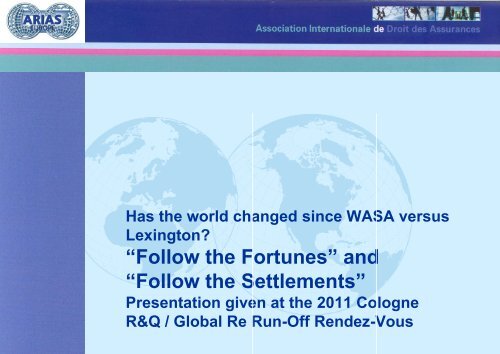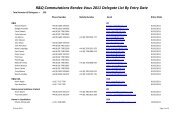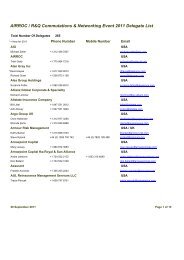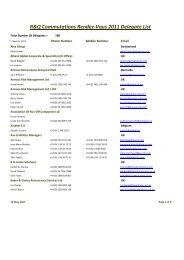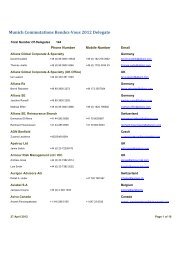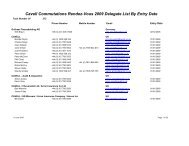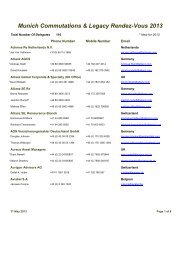“Follow the Fortunes” and “Follow the Settlements”
“Follow the Fortunes” and “Follow the Settlements”
“Follow the Fortunes” and “Follow the Settlements”
You also want an ePaper? Increase the reach of your titles
YUMPU automatically turns print PDFs into web optimized ePapers that Google loves.
Has <strong>the</strong> world changed since WASA versus<br />
Lexington?<br />
<strong>“Follow</strong> <strong>the</strong> <strong>Fortunes”</strong> <strong>and</strong><br />
<strong>“Follow</strong> <strong>the</strong> <strong>Settlements”</strong><br />
Presentation given at <strong>the</strong> 2011 Cologne<br />
R&Q / Global Re Run-Off Rendez-Vous
Slide 2<br />
Has <strong>the</strong> world changed since WASA versus Lexington?<br />
Indeed it has…<br />
� William <strong>and</strong> Kate are soon going to marry<br />
� The ozone hole is going to heal (ra<strong>the</strong>r than to exp<strong>and</strong>) by <strong>the</strong> middle of<br />
this century<br />
� ARIAS Europe has moved its seat to Hamburg<br />
� The Arabian World has removed some dictators from office<br />
� The German government has removed <strong>the</strong> only star in boring German<br />
politics from his payroll<br />
� The American government has waited for being asked by <strong>the</strong> World before<br />
exercising <strong>the</strong>ir legal rights as <strong>the</strong> world„s policemen<br />
� …
stolen from<br />
Dirk Meissner<br />
Der letzte<br />
Leistungsträger<br />
© 2004<br />
Wirtschaftsverlag<br />
Carl Ueberreuter<br />
Slide 3<br />
Never forget, we all have our problems.<br />
Just like yourself, you know, I am up to<br />
my neck in deep water!
Slide 4<br />
Outline of <strong>the</strong> presentation<br />
� <strong>“Follow</strong> <strong>the</strong> <strong>Fortunes”</strong> <strong>and</strong> <strong>“Follow</strong> <strong>the</strong> <strong>Settlements”</strong> in<br />
Reinsurance Contracts<br />
� Wasa v. Lexington <strong>and</strong> its impact on Continental Europe
Slide 5<br />
Gliederung<br />
� <strong>“Follow</strong> <strong>the</strong> <strong>Fortunes”</strong> <strong>and</strong> <strong>“Follow</strong> <strong>the</strong> <strong>Settlements”</strong> in<br />
Reinsurance Contracts<br />
– Common Law v. Statutory Law Jurisdiction<br />
– German (Re-)Insurance Contract Law as <strong>the</strong> showcase for a statutory<br />
law Jurisdiction<br />
– System of <strong>the</strong> Law of Contract in German statutory law<br />
– „Customs of <strong>the</strong> Trade“ (§ 346 HGB) „biasing“ <strong>the</strong> German reinsurance<br />
contract<br />
– „International Customs of <strong>the</strong> Reinsurance Trade“ ?<br />
– German Customs of <strong>the</strong> Reinsurance Trade put into <strong>the</strong> international<br />
(common law v. statutory law) perspective<br />
– „Customs of <strong>the</strong> Trade“ v. Scope of <strong>the</strong> Reinsurance Contract<br />
� Wasa v. Lexington <strong>and</strong> its impact on Continental Europe
Slide 6<br />
<strong>“Follow</strong> <strong>the</strong> <strong>Fortunes”</strong> & <strong>“Follow</strong> <strong>the</strong> <strong>Settlements”</strong> in<br />
R/I Contracts<br />
Common Law v. Statutory Law Jurisdictions<br />
� <strong>the</strong> obligation assumed by one party to a contract to follow <strong>the</strong> o<strong>the</strong>r party<br />
in its fortunes or in as much as that settles his obligations in lieu of a third<br />
party are specific contractual obligations common for reinsurance contracts<br />
� even though reinsurance contracts very often involve parties of differing<br />
nationality, no „international“ reinsurance contract law can be referred to<br />
as governing <strong>the</strong>se contracts – as an almost general rule contract law is<br />
<strong>the</strong> law of a state<br />
� in as much as a contract does not specify <strong>the</strong> applicable contract law, <strong>the</strong><br />
(national) rules on <strong>the</strong> conflict of laws define, which law to apply<br />
� Common law jurisdictions (law set by legal precedent) such as <strong>the</strong> Anglo-<br />
American <strong>and</strong> statutory law jurisdictions such as <strong>the</strong> Continental European<br />
both claim leadership in this field of (contract) law
Slide 7<br />
<strong>“Follow</strong> <strong>the</strong> <strong>Fortunes”</strong> & <strong>“Follow</strong> <strong>the</strong> <strong>Settlements”</strong> in<br />
R/I Contracts<br />
German (Re-)Insurance Contract Law as <strong>the</strong> showcase for a<br />
statutory law Jurisdiction Jurisdiction<br />
� is <strong>the</strong>re a German Reinsurance Contract Law ?<br />
� German law of contract is strongly governed by <strong>the</strong> principle that <strong>the</strong><br />
parties to a contract shall decide if <strong>and</strong> in what form to conclude it <strong>and</strong><br />
what shall be its content („Privatautonomie“)<br />
� this general rule is restricted only by a very limited set of manadatory<br />
rules of law<br />
� <strong>the</strong>se rules will most probably be codified <strong>and</strong> may claim to be expression<br />
of public policy („ordre public“)
Slide 8<br />
<strong>“Follow</strong> <strong>the</strong> <strong>Fortunes”</strong> & <strong>“Follow</strong> <strong>the</strong> <strong>Settlements”</strong> in<br />
R/I Contracts<br />
System of <strong>the</strong> Law of Contract in German statutory law<br />
� to <strong>the</strong> extent that such m<strong>and</strong>atory rules shall not be breached <strong>the</strong> parties„<br />
intentions in concluding <strong>the</strong>ir contract shall primarily govern <strong>the</strong>ir<br />
relationship<br />
� customs of <strong>the</strong> specific trade (§ 346 HGB) or non-m<strong>and</strong>atory („dispositive“)<br />
rules applicable to <strong>the</strong> specific type of contract shall be used to interpret<br />
<strong>the</strong> contract terms or to fill in gaps<br />
– according to <strong>the</strong> prevailing legal opinion a number of customary terms<br />
shall be implied to a reinsurance contract<br />
– no German statute has – however – been stipulated to specifically<br />
govern a reinsurance contract (reinsurance contracts are not governed<br />
by insurance contract law (§ 209 VVG))<br />
� thus general law of contract as provided by <strong>the</strong> BGB will govern <strong>the</strong><br />
contracts – unless contrary to <strong>the</strong> parties agreement <strong>and</strong> intentions
Slide 9<br />
<strong>“Follow</strong> <strong>the</strong> <strong>Fortunes”</strong> & <strong>“Follow</strong> <strong>the</strong> <strong>Settlements”</strong> in<br />
R/I Contracts<br />
„Customs of <strong>the</strong> Trade“ „biasing“ <strong>the</strong> German reinsurance contract<br />
� according to German statutory law, <strong>the</strong> parties to a commercial transaction<br />
shall abide to <strong>the</strong> custom <strong>and</strong> usage of <strong>the</strong>ir trade (§ 346 HGB)<br />
� customs of a specific trade – in reinsurance trade „reinsurance custom“ –<br />
supplement <strong>the</strong> terms of a contract – are implied to such contract – <strong>and</strong> take<br />
precedence over dispositive codified law<br />
� custom is based on a uniform, consistent <strong>and</strong> voluntary usage by those<br />
acting in a trade: its application <strong>and</strong> scope are defined by that common<br />
usage<br />
� custom applies like a norm (normatively) independent from <strong>the</strong> parties‟<br />
intentions or even knowledge as to its existence<br />
� custom can be deviated from – it can also be waived – but such deviation<br />
should be <strong>the</strong> exemption ra<strong>the</strong>r than <strong>the</strong> rule; thus unless <strong>the</strong> parties<br />
specifically agree not to apply such custom or agree on terms contrary to<br />
such custom it shall govern <strong>the</strong>ir contract
Slide 10<br />
<strong>“Follow</strong> <strong>the</strong> <strong>Fortunes”</strong> & <strong>“Follow</strong> <strong>the</strong> <strong>Settlements”</strong> in<br />
R/I Contracts<br />
„Customs of <strong>the</strong> Trade“ „biasing“ <strong>the</strong> German reinsurance contract<br />
� according to German prevailing – if not general – opinion <strong>the</strong> following<br />
reinsurance custom form <strong>the</strong> backbone of any reinsurance contract subject<br />
to German contract law:<br />
– <strong>the</strong> cedent‟s right <strong>and</strong> duty to manage <strong>the</strong> business which is <strong>the</strong> subject<br />
matter of <strong>the</strong> reinsurance contract (“Geschäftsführungsrecht <strong>and</strong> –pflicht”)<br />
– <strong>the</strong> reinsurer‟s duties to follow <strong>the</strong> reinsured in those decsions taken in<br />
course of exercising his abovementioned duty (follow <strong>the</strong> settlements /<br />
“Folgepflicht”) <strong>and</strong> to carry <strong>the</strong> burden of any obligation arising to <strong>the</strong><br />
cedent without his contribution in course of exercising that duty (follow <strong>the</strong><br />
fortunes / “Schicksalsteilung”)<br />
� o<strong>the</strong>r reinsurance custom is also accepted <strong>and</strong> adhered to in German<br />
reinsurance contract law which is not relevant for this presentation<br />
(e.g. reinsured‟s duty to hold a net retention; broker as agent of reinsured)
Slide 11<br />
<strong>“Follow</strong> <strong>the</strong> <strong>Fortunes”</strong> & <strong>“Follow</strong> <strong>the</strong> <strong>Settlements”</strong> in<br />
R/I Contracts<br />
„Customs of <strong>the</strong> Trade“ „biasing“ <strong>the</strong> German reinsurance contract<br />
� thus,<br />
– in a reinsurance contract governed by German contract law,<br />
– to <strong>the</strong> extent that <strong>the</strong> terms of that contract cover <strong>the</strong> relevant business<br />
<strong>and</strong> against <strong>the</strong> relevant (insured) perils in <strong>the</strong> relevant original policy<br />
term <strong>and</strong> reinsurance contract liability term<br />
– unless <strong>the</strong> parties to such contract specifically agree to waive such<br />
custom or to alter its scope<br />
� <strong>the</strong> reinsured is entitled <strong>and</strong> obliged to manage <strong>the</strong> business covered<br />
applying <strong>the</strong> diligence he applies in his own matters („diligentia quam in<br />
suis“) <strong>and</strong><br />
� <strong>the</strong> reinsurer is obliged to follow <strong>the</strong> reinsured„s decisions taken in course of<br />
managing <strong>the</strong> business <strong>and</strong> to pay as his reinsured may be obliged to pay<br />
independantly from his intention(s) by virtue of having been <strong>the</strong> risk carrier<br />
in <strong>the</strong> original business covered
Slide 12<br />
<strong>“Follow</strong> <strong>the</strong> <strong>Fortunes”</strong> & <strong>“Follow</strong> <strong>the</strong> <strong>Settlements”</strong> in<br />
R/I Contracts<br />
„International Customs of <strong>the</strong> Reinsurance Trade“ ?<br />
� <strong>the</strong> custom of an international trade may be acceptable as applicable<br />
under German law – <strong>and</strong> reinsurance custom is widely accepted as<br />
international custom<br />
� however, local custom shall prevail even if applied to an international trade<br />
if <strong>and</strong> as long as <strong>the</strong> relevant local law shall be applied to <strong>the</strong> contract<br />
� thus, to <strong>the</strong> extent that <strong>the</strong> parties to an international reinsurance contract<br />
have agreed to application of German law, German custom shall also be<br />
applicable…<br />
� …even if on an international level a common <strong>and</strong> uniform approach to <strong>the</strong><br />
relevant custom cannot be ascertained
Slide 13<br />
<strong>“Follow</strong> <strong>the</strong> <strong>Fortunes”</strong> & <strong>“Follow</strong> <strong>the</strong> <strong>Settlements”</strong> in<br />
R/I Contracts<br />
German Customs of <strong>the</strong> Reinsurance Trade put into <strong>the</strong><br />
international (common law v. statutory law) perspective<br />
Reinsurance Custom<br />
(Rückversicherungsbrauch )<br />
BGB statutory law jurisdictions<br />
(e.g. Germany, Switzerl<strong>and</strong>, Austria)<br />
Code Napoléon statutory law<br />
Jurisdictions (e.g. France)<br />
European Common Law jurisdictions<br />
(e.g. Engl<strong>and</strong>)<br />
Overseas Common Law jurisdictions<br />
(e.g. member states of <strong>the</strong> US)<br />
Cedant's<br />
Right to Manage <strong>the</strong><br />
Business Covered<br />
Cedant's<br />
Duty to Manage <strong>the</strong><br />
Business Covered<br />
Reinsurer's<br />
Duty to<br />
Follow <strong>the</strong> Fortunes<br />
Reinsurer's<br />
Duty to<br />
Follow <strong>the</strong> Settlements<br />
Geschäftsführungsrecht Geschäftsführungspflicht Folgepflicht Schicksalsteilung<br />
local custom local custom local custom local custom<br />
probably<br />
local custom<br />
probably<br />
local custom<br />
n/a n/a<br />
n/a n/a<br />
local custom local custom<br />
incorporation by clear<br />
language required<br />
local custom<br />
in some states<br />
incorporation by clear<br />
language required<br />
local custom
Slide 14<br />
<strong>“Follow</strong> <strong>the</strong> <strong>Fortunes”</strong> & <strong>“Follow</strong> <strong>the</strong> <strong>Settlements”</strong> in<br />
R/I Contracts<br />
„Customs of <strong>the</strong> Trade“ v. Scope of <strong>the</strong> Reinsurance Contract<br />
� most common – though often unintentional – way of limiting <strong>the</strong> impact of<br />
custom is by defining <strong>the</strong> scope of reinsurance cover constituing agreement<br />
on terms contrary to such custom<br />
� subject matter may be<br />
– <strong>the</strong> reinsured risks (e.g. risks attaching during a specified term)<br />
– <strong>the</strong> reinsured peril (e.g. losses arising from certain named perils only)<br />
– <strong>the</strong> reinsured loss (e.g. losses occuring during a specified term)<br />
… deviating from or limiting as compared to <strong>the</strong> original coverage provided<br />
� such definition may be „positive“ or „negative“ (i.e. by excluding certain<br />
risks, perils or losses)<br />
� it may also be introduced in case of facultative reinsurance
Slide 15<br />
Gliederung<br />
� <strong>“Follow</strong> <strong>the</strong> <strong>Fortunes”</strong> <strong>and</strong> <strong>“Follow</strong> <strong>the</strong> <strong>Settlements”</strong> in<br />
Reinsurance Contracts<br />
� Wasa v. Lexington <strong>and</strong> its impact on Continental Europe<br />
– facts of <strong>the</strong> case<br />
– implied terms of <strong>the</strong> reinsurance contract (under English law)<br />
– scope of reinsurance coverage provided<br />
– implied terms of <strong>the</strong> reinsurance contract (under German law)<br />
– how will <strong>the</strong> Courts (or Tribunals of Arbitrators) decide ?<br />
– has <strong>the</strong> reinsurance world, from <strong>the</strong> German legal perspective,<br />
changed since Wasa v. Lexington ?
Slide 16<br />
Wasa v. Lexington <strong>and</strong> its impact on Continental<br />
Europe<br />
facts of <strong>the</strong> case<br />
� Wasa (<strong>and</strong> AGF) reinsuring Lexington for 2.5% each xs a 250„ US$ „per<br />
occurance“ deductible of a DIC Property Damage insurance policy provided<br />
by Lexington to ALCOA for <strong>the</strong> period 01.07.1977 – 01.07.1980<br />
� „Contributing Facultative reinsurance“ covering „All Risks of Physical Loss<br />
or Damage … &/or as original“, „Full R/I Clause“, „Follow <strong>the</strong> Settlements<br />
Clause“, reinsurance contract governed by English law<br />
� proportinal reinsurance „warranted same gross rate, terms <strong>and</strong> conditions<br />
as … original“<br />
� insurance formalized on Lexington„s „Special Floater Form“ providing<br />
coverage for <strong>the</strong> policy„s three year term limited to US$ 20„„ any one<br />
occurance, „occurance“ being defined as „any one loss(es), disaster(s) or<br />
casualty(ies) arising out of one event or common cause“<br />
� waste related contamination to (58) ALCOA sites over a period commencing<br />
in <strong>the</strong> early 1940„s <strong>and</strong> continuing well into <strong>the</strong> 1980„s (at least 1984)
Slide 17<br />
Wasa v. Lexington <strong>and</strong> its impact on Continental<br />
Europe<br />
facts of <strong>the</strong> case (continued)<br />
� 04.05.2000 Washington Supreme Court ruling:<br />
– original insuring clause shall cover any physical loss or damage<br />
„manifesting“ itself during <strong>the</strong> time a DIC policy was in effect<br />
– including pollution damage starting (occuring) before policy inception<br />
– involving – in <strong>the</strong> aggregate – potential claims of US$ 180„„<br />
– Wasa <strong>and</strong> AGF do not submit that this ruling was perverse or wrong<br />
under <strong>the</strong> law applied to <strong>the</strong> original policy (Pennsylvania)<br />
� ALCOA <strong>and</strong> Lexington settling <strong>the</strong> case for US$ 103„„ (common ground<br />
of <strong>the</strong> parties that this was to be considered an honest <strong>and</strong> businesslike<br />
settlement)<br />
� proportional share of loss claimed under facultative reinsurance after<br />
deduction of US$ 250„
Slide 18<br />
Wasa v. Lexington <strong>and</strong> its impact on Continental<br />
Europe<br />
implied terms of <strong>the</strong> reinsurance contract (under English law)<br />
� English law does not envisage<br />
– nei<strong>the</strong>r <strong>the</strong> cedent‟s right <strong>and</strong> duty to manage <strong>the</strong> business<br />
– nor <strong>the</strong> reinsurer‟s duties to follow <strong>the</strong> reinsured in those decsions taken<br />
in course of exercising his abovementioned duty (follow <strong>the</strong> settlements)<br />
or to carry <strong>the</strong> burden of any obligation arising to <strong>the</strong> cedent without his<br />
contribution in course of exercising that duty (follow <strong>the</strong> fortunes)<br />
an implied term of a reinsurance contract<br />
� however, <strong>the</strong> parties are entitled to incorporate such provisions into <strong>the</strong>ir<br />
contract which make it subject to such terms along a very similar line as<br />
considered customary in o<strong>the</strong>r major jurisdictions<br />
� generally speaking, clear <strong>and</strong> unambiguous language of <strong>the</strong> contract is<br />
required to prove that intention of <strong>the</strong> parties
Slide 19<br />
Wasa v. Lexington <strong>and</strong> its impact on Continental<br />
Europe<br />
scope of reinsurance coverage provided<br />
� <strong>the</strong> reinsurance contract was subject to „full reinsurance“, thus to „follow <strong>the</strong><br />
settlements“ <strong>and</strong> possibly even covering <strong>the</strong> reinsured „back to back“<br />
� <strong>the</strong> reinsurance contract incorporates <strong>the</strong> original scope of coverage,<br />
including <strong>the</strong> policy term <strong>and</strong> its insuring clause<br />
� <strong>the</strong> reinsurance contract is governed by English law, which gives rise to <strong>the</strong><br />
assumption that – inasmuch as <strong>the</strong> interpretation of original policy terms is<br />
concerned – <strong>the</strong> law applicable to <strong>the</strong> insurance contract has to be taken into<br />
consideration<br />
� however, given <strong>the</strong> importance of <strong>the</strong> term <strong>and</strong> <strong>the</strong> scope of <strong>the</strong> reinsurance,<br />
<strong>the</strong>se – in English law – cannot be changed from „losses occuring during<br />
01.07.1977 through 01.07.1980“ to „losses manifesting itself, but occuring at<br />
any time befrore, during or after 01.07.1977 through 01.07.1980“
Slide 20<br />
Wasa v. Lexington <strong>and</strong> its impact on Continental<br />
Europe<br />
implied terms of <strong>the</strong> reinsurance contract (under German law)<br />
� in a reinsurance contract governed by German contract law,<br />
– <strong>the</strong> reinsured is entitled <strong>and</strong> obliged to manage <strong>the</strong> business covered<br />
applying <strong>the</strong> diligence he applies in his own matters („diligentia quam<br />
in suis“) <strong>and</strong><br />
– <strong>the</strong> reinsurer is obliged to follow <strong>the</strong> reinsured„s decisions taken in<br />
course of managing <strong>the</strong> business <strong>and</strong> to pay as his reinsured may be<br />
obliged to pay independantly from his intention(s) by virtue of having<br />
been <strong>the</strong> risk carrier in <strong>the</strong> original business covered…<br />
� …unless <strong>the</strong>se terms implied by local custom are waived by <strong>the</strong> parties or<br />
<strong>the</strong> parties specifically agree to alter its scope<br />
� …but only to <strong>the</strong> extent that <strong>the</strong> terms of that contract cover <strong>the</strong> relevant<br />
business <strong>and</strong> against <strong>the</strong> relevant (insured) perils in <strong>the</strong> relevant original<br />
policy term <strong>and</strong> reinsurance contract liability term;<br />
defining <strong>the</strong> scope of reinsurance cover constituing agreement on terms<br />
contrary to such custom is <strong>the</strong> most common – though often unintentional<br />
– way of limiting <strong>the</strong> impact of custom
Slide 21<br />
Wasa v. Lexington <strong>and</strong> its impact on<br />
Continental Europe<br />
how will <strong>the</strong> Courts (or Tribunals of Arbitrators) decide?<br />
� who is to know ?<br />
� however, according to almost unanimous legal opinion in Germany, nei<strong>the</strong>r<br />
<strong>the</strong> duty to follow <strong>the</strong> settlements, nor that to follow <strong>the</strong> fortunes, shall oblige<br />
<strong>the</strong> reinsurer to pay a claim which is outside of <strong>the</strong> reinsurance coverage<br />
provided<br />
� <strong>the</strong> formula „All Risks of Physical Loss or Damage … &/or as original, 36<br />
months at date 1.1.77“ will incorporate <strong>the</strong> original insuring clause including<br />
<strong>the</strong> original limit <strong>and</strong> loss occurance definition into <strong>the</strong> reinsurance contract<br />
� this may limit <strong>the</strong> effect of <strong>the</strong> customs of <strong>the</strong> trade just as it was intended to<br />
be <strong>the</strong> starting point for <strong>the</strong>ir application<br />
� inasmuch as <strong>the</strong> terms of <strong>the</strong> reinsurance contract limit <strong>the</strong> scope of<br />
coverage to losses occuring during <strong>the</strong> contract term, <strong>the</strong> reinsurer is not<br />
covered against losses manifesting itself during <strong>the</strong> term but occuring prior to<br />
or after that term
Slide 22<br />
Wasa v. Lexington <strong>and</strong> its impact on<br />
Continental Europe<br />
has <strong>the</strong> reinsurance world, from <strong>the</strong> German legal perspective,<br />
changed since Wasa v. Lexington ?<br />
� no one ever questioned <strong>the</strong> opinion that even <strong>the</strong> bloodiest nuisance if<br />
binding on <strong>the</strong> reinsured will oblige <strong>the</strong> reinsurer to pay „following <strong>the</strong><br />
reinsured„s fortunes“<br />
� nei<strong>the</strong>r Wasa nor AGF <strong>and</strong> in turn nei<strong>the</strong>r of <strong>the</strong> Courts called in to judge<br />
ever questioned <strong>the</strong> commercial correctness of <strong>the</strong> settlement achieved by<br />
Lexington<br />
� however, <strong>the</strong> English decision may imply a deeper questioning <strong>and</strong><br />
analyzing of <strong>the</strong> reinsurance cover provided – to what extent may contract<br />
terms have a broadening as well as limiting effect on <strong>the</strong> coverage provided
Slide 23<br />
Thank you for your attention !<br />
please visit our website:<br />
www.arias-europe.org<br />
Dr. Andreas Schwepcke<br />
Managing Director <strong>and</strong> Member of <strong>the</strong> Board<br />
ARIAS Europe e. V., Hamburg<br />
Starnberg Branch<br />
Wilhelmshöhenstr. 11a<br />
82319 Starnberg, Germany<br />
Phone +49 8151 12644<br />
fax +49 8151 9713335<br />
<strong>and</strong>reas.schwepcke@arias-europe.org


